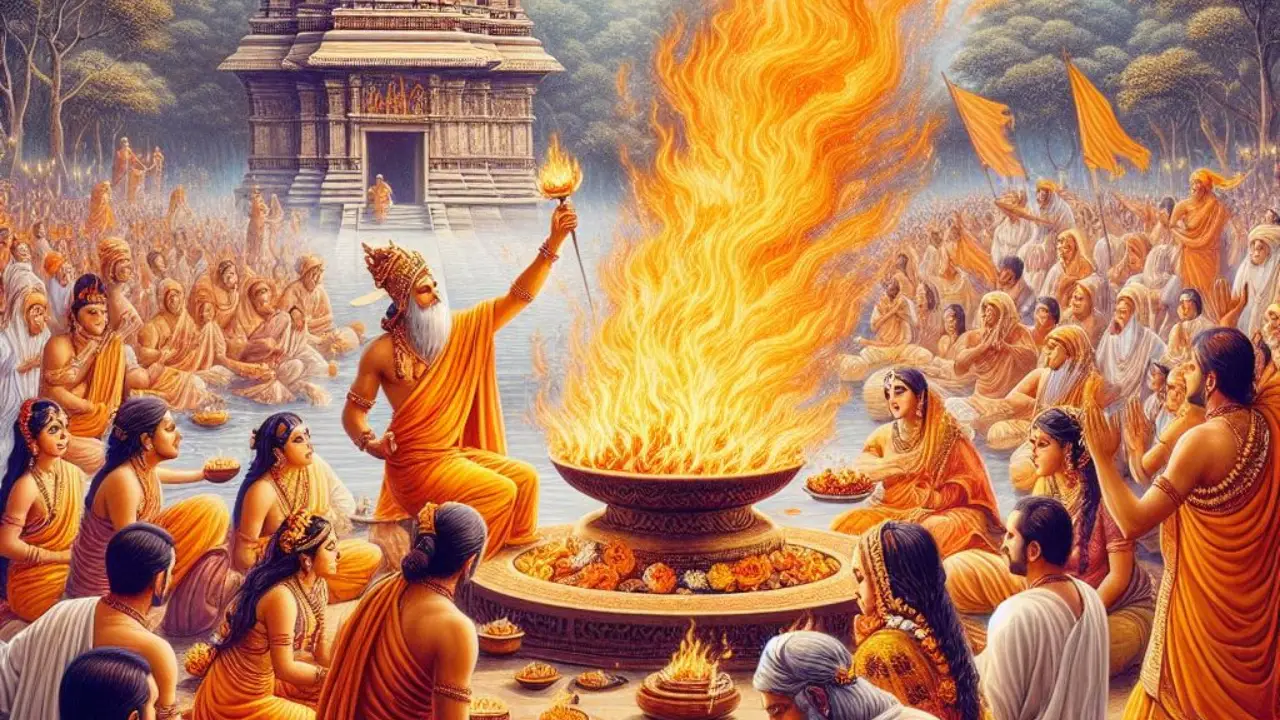Fire has long held a profound significance in the tapestry of Hindu spirituality, its flames flickering as symbols of both destruction and creation, purity and transformation. In Hinduism, fire is not merely a physical element. It is a divine entity, revered as Agni, the god of fire, and central to the ritual of Yajna. Let’s delve into the depths of this ancient tradition of Agni and Yajna and explore its timeless relevance in the contemporary world.
The Essence of Agni:
Agni, the Sanskrit word for fire, embodies much more than its elemental form. It symbolizes light, knowledge, and energy, serving as a conduit between the earthly realm and the divine. In Hindu cosmology, Agni is one of the most ancient deities, revered for his purifying and transformative powers.
The Ritual of Yajna:
At the heart of Hinduism lies the ritual of Yajna, a sacred fire ceremony performed to honor various deities, seek blessings, and promote harmony and prosperity. Yajna involves the offering of oblations into the fire, accompanied by Vedic hymns and mantras chanted by trained priests.
Significance in Daily Life:
While Yajna is often performed on special occasions and religious ceremonies, the significance of fire extends beyond the confines of ritualistic practices. Fire is central to many household ceremonies, such as weddings, births, and funerals. It symbolizes the presence of the divine and the cyclical nature of existence.
Metaphorical Meanings:
Beyond its physical manifestation, fire holds deep metaphorical meanings in Hindu philosophy. It represents the burning away of ignorance and impurities, paving the way for spiritual enlightenment and growth. Just as fire consumes fuel to produce light and heat, individuals strive to transcend their worldly desires and attachments to attain self-realization.
Historical and Mythological Context:
The importance of fire in Hinduism finds resonance in ancient scriptures and mythological narratives. The Rigveda, one of the oldest texts in Hinduism, contains numerous hymns dedicated to Agni, praising his vitality and omnipresence. Mythological tales depict Agni’s pivotal role as the messenger of the gods, bridging the celestial and mortal realms.
Cosmic Symbolism:
In Hindu cosmology, fire symbolizes the cosmic energy that sustains the universe. Just as the sun illuminates the heavens, Agni represents the divine light that permeates all existence. The act of offering oblations into the sacred fire is believed to resonate with the cosmic order, aligning individuals with the rhythm of the cosmos.
Healing and Purification:
Fire is often associated with purification and healing in Hinduism. Believers attribute cleansing power to the flames of the sacred fire, which restore harmony and balance, cleansing physical and spiritual impurities. Ayurveda, the ancient medical system, reveres Agni as the digestive fire, assimilating nutrients and sustaining vitality.
Symbol of Transformation:
Just as fire transforms wood into ash, Hinduism teaches that the human soul undergoes a process of transformation, shedding its earthly attachments to attain spiritual liberation. The ritual of Yajna serves as a metaphorical journey of self-discovery and renewal, guiding individuals towards inner transformation and enlightenment.
Social Harmony and Unity:
Yajna is not merely a personal ritual; it is also a communal endeavor aimed at fostering social harmony and unity. Through collective participation and shared prayers, individuals come together to invoke divine blessings and offer gratitude for the abundance of life. Yajna thus serves as a powerful reminder of the interconnectedness of all beings and the importance of cooperation and mutual respect.
Environmental Consciousness:
In today’s era of environmental degradation, the reverence for fire in Hinduism takes on added significance. The ritual of Yajna emphasizes the sacred relationship between humans and nature. It highlights the importance of ecological balance and sustainable living. Practitioners honor Agni and nurture the sacred fire to remind themselves of their responsibility to protect and preserve the natural world for future generations.
Philosophical Insights:
The symbolism of fire in Hinduism offers profound philosophical insights into the nature of existence and the human condition. Just as fire consumes all that is impure, individuals are encouraged to transcend their ego-driven desires and attachments. Seeking instead the eternal flame of inner peace and enlightenment. Through the practice of mindfulness and self-awareness, one can ignite the flames of spiritual awakening and discover the true essence of being.
Living Tradition:
Despite the passage of millennia, the tradition of fire worship continues to thrive in contemporary Hinduism. From elaborate temple ceremonies to humble household rituals, the flames of Agni continue to burn bright. It inspires devotion and reverence in the hearts of millions. In a world filled with uncertainty and turmoil, the sacred fire serves as a beacon of hope and guidance. It guides seekers on their quest for truth and transcendence.
Contemporary Relevance:
In today’s fast-paced world, the timeless wisdom of Agni and Yajna continues to offer solace and guidance to seekers of truth. The ritualistic aspect may have evolved, but the underlying principles of purification, devotion, and interconnectedness remain unchanged. Many practitioners incorporate the essence of fire worship into their daily lives through meditation, self-reflection, and acts of service.
Conclusion:
The significance of fire in Hinduism transcends mere symbolism; it is a living embodiment of divine presence and cosmic energy. As we kindle the flames of devotion and understanding, let us remember the eternal wisdom imparted by Agni and Yajna. In the dance of fire, we find the essence of spirituality, guiding us on the path of enlightenment and inner peace.
Share your thoughts on the profound significance of Agni and Yajna in Hinduism. How has this ancient tradition influenced your spiritual journey?





